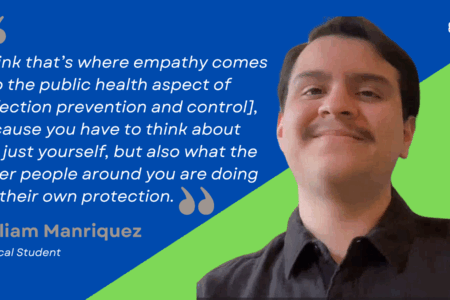
Share On Social!
CDC’s Project Firstline knows that healthcare workers are short on time, but it shouldn’t limit their access to practical and valuable infection control training.
That’s why CDC’s Project Firstline developed Infection Control Micro-Learns – a series of guided infection control discussions that can be easily incorporated into team meetings or huddles facilitated by an experienced team member with infection control expertise.
These short and easy-to-understand learning opportunities can help healthcare workers recognize and minimize infection control risks to protect themselves, coworkers, and patients from infectious diseases.
Let’s explore the Infection Control Micro-Learn on cough and congestion!
What To Do When a Patient Has a Cough and Congestion
 A cough in combination with congestion—a stuffy, runny nose, runny eyes, and a nasally voice—is commonly caused by a virus.
A cough in combination with congestion—a stuffy, runny nose, runny eyes, and a nasally voice—is commonly caused by a virus.
These viruses spread easily when an infected person talks, breathes, coughs, or otherwise blows air out of their nose or mouth. In fact, one person releasing these germs into the air can infect multiple people quickly.
If you’re near a patient with cough and congestion and don’t know what’s causing their symptoms, use a facemask or respirator to keep from breathing in infectious particles.
As soon as possible, the patient should be placed in a separate room, away from others, and should wear a mask to keep germs from spreading.
Check to make sure air vents in the room are not blocked, as this could prevent the ventilation system from working properly.
Preparation Is Key
In addition to the above steps, familiarize yourself with facility protocols for patients with respiratory virus symptoms, facility triage and screening procedures, where to find respirators, and whom to call if there are none left.
Project Firstline encourages healthcare workers and leaders to take advantage of this free infection control training resource, especially to prepare for the upcoming respiratory virus season.
You can access the Cough and Congestion Micro-Learn, along with a growing list of other training topics, on the Project Firstline website. Stay tuned for more topics in the coming months!
What Can You Do to Promote Infection Control in Your Healthcare Setting?
Help keep yourself, your colleagues, and your patients safe from infectious disease threats by building on your infection control knowledge!
To show your dedication, sign this pledge to complete an infection control training or activity through CDC’s Project Firstline!
You can also share infection control training opportunities with healthcare colleagues via LinkedIn with our Project Firstline social media toolkit.
You can access more information about infection prevention and control in healthcare by visiting resources from CDC Project Firstline.
Salud America! at UT Health San Antonio is working with the National Hispanic Medical Association to bring Project Firstline infection control educational content to healthcare workers, so they are equipped with the knowledge they need to protect themselves, their facilities, and their patients (Latinos and all communities) from infectious disease threats in healthcare settings.
Check out some of the articles from this partnership:
- What is Project Firstline?
- What is the Goal of Infection Prevention and Control in Healthcare Settings?
- What’s a Virus?
- What is Ventilation and Why Does It Matter?
- Contact Time: What is It and How Does it Impact Infection Control?
- The Surprising Difference Between Cleaning and Disinfection
- What’s a Respiratory Droplet and Why Does It Matter?
- We Need to Talk about Hand Hygiene Again
- Why are Gowns, Gloves, and Eye Protection Recommended for COVID-19?
Check out some of the Latino healthcare workers who are heroes for infection control:
- Anna Valdez: Tackling Infection Control with Education from Classroom to Clinic
- Wanda Montalvo: Preventing Infections in Community Health Centers, Latino Communities
- Ricardo Correa: Endocrinologist and Infection Control Leader for the Latino Community
Learn More about Project Firstline!
Editor’s Note: This article is part of a collaboration between Salud America!, the National Hispanic Medical Association, and the CDC’s Project Firstline. To find resources training materials, and other tools to bolster knowledge and practice of infection control, visit Project Firstline and view Salud America!’s infection control content.
Explore More:
Infection ControlBy The Numbers
142
Percent
Expected rise in Latino cancer cases in coming years



